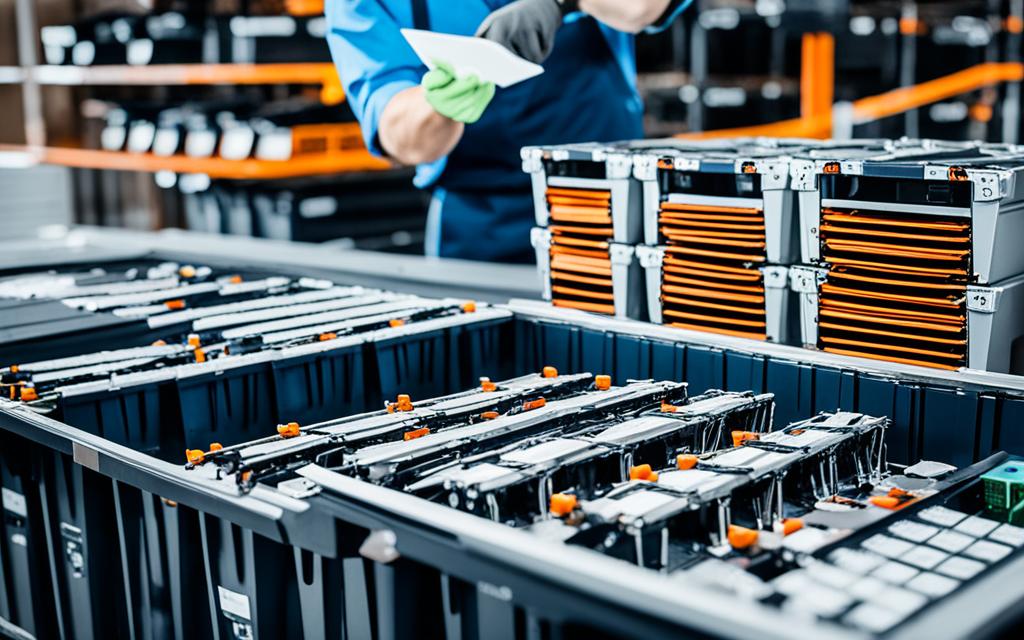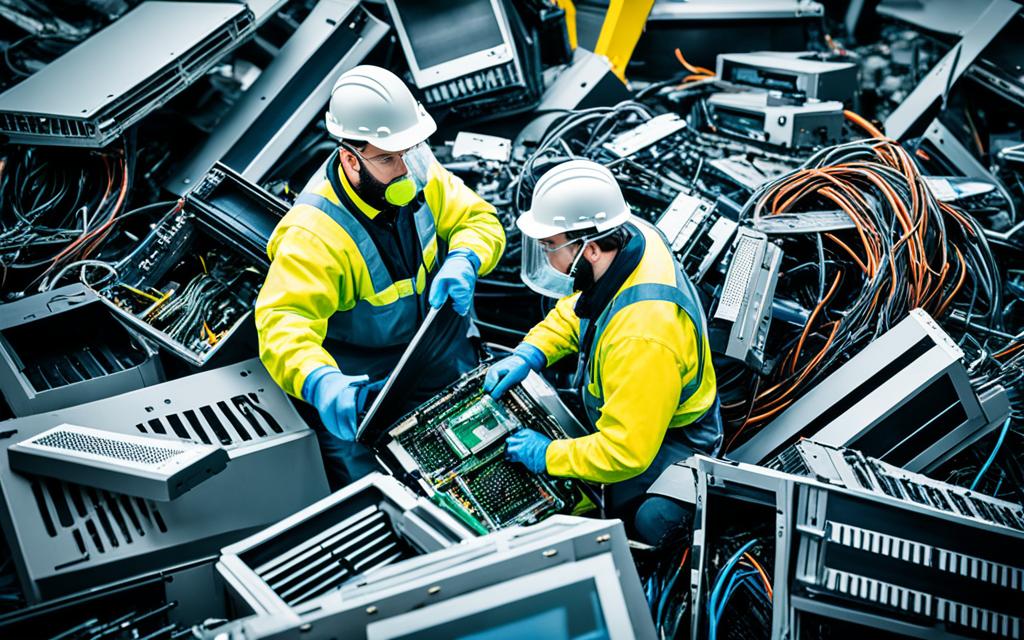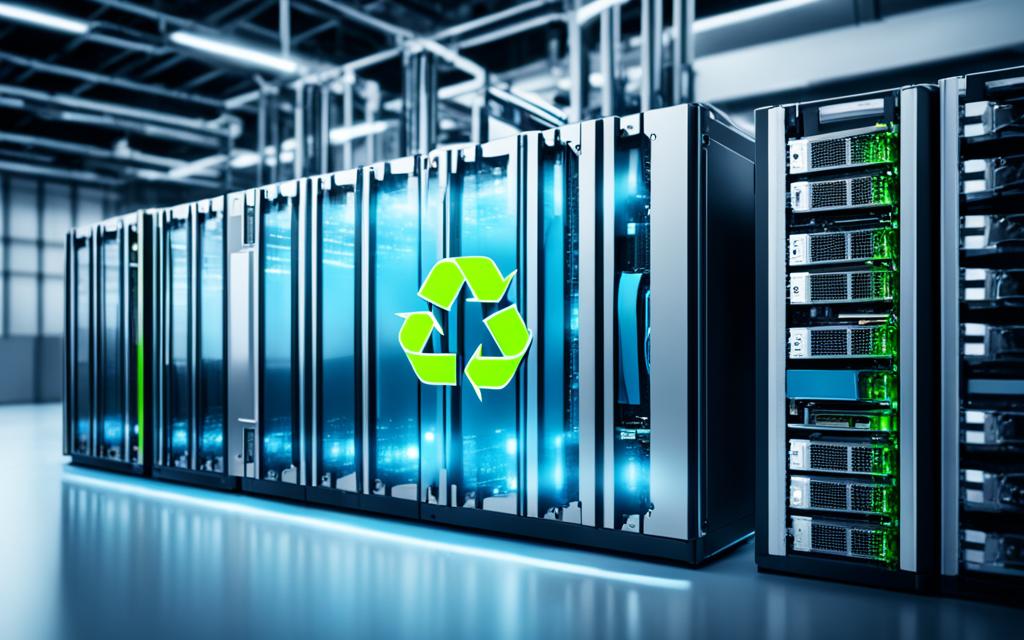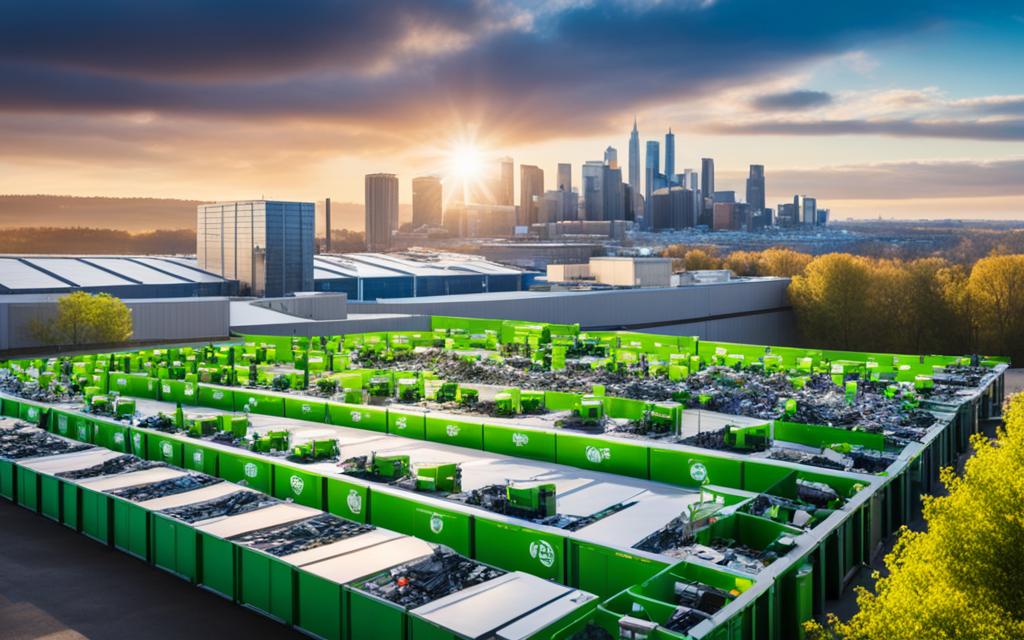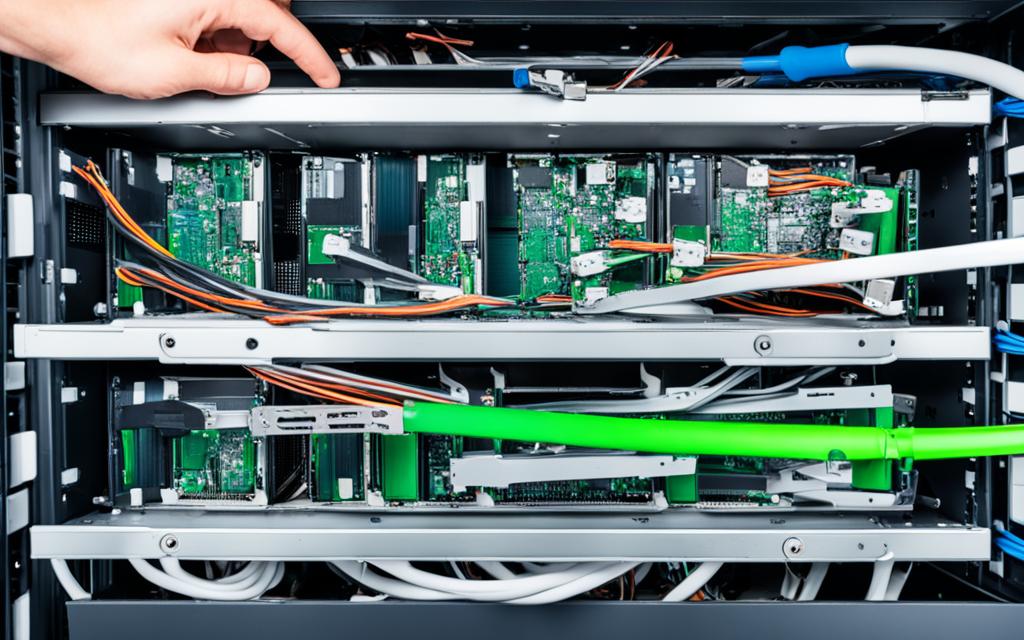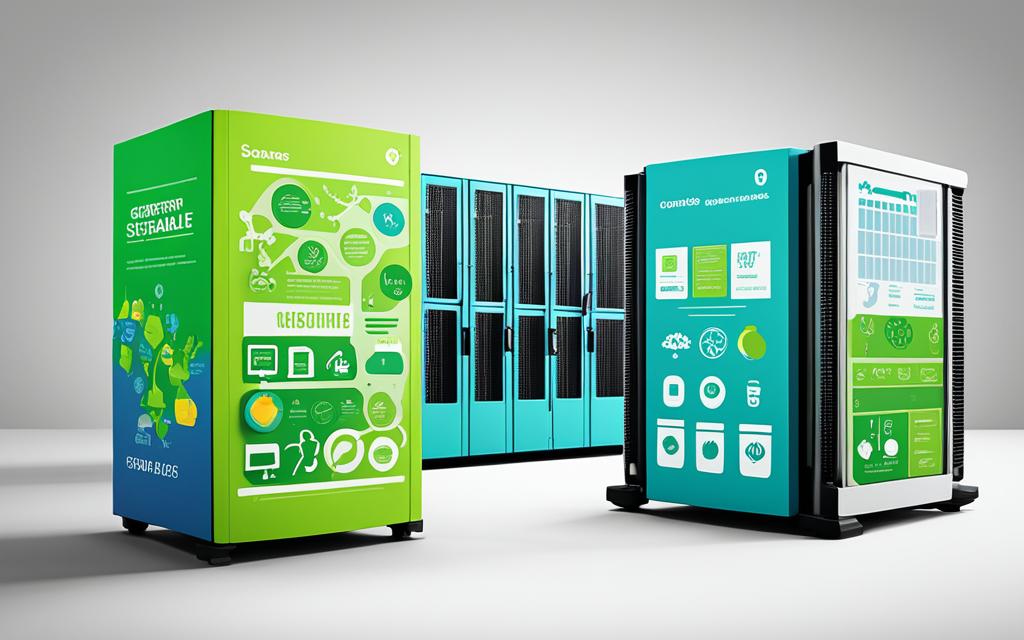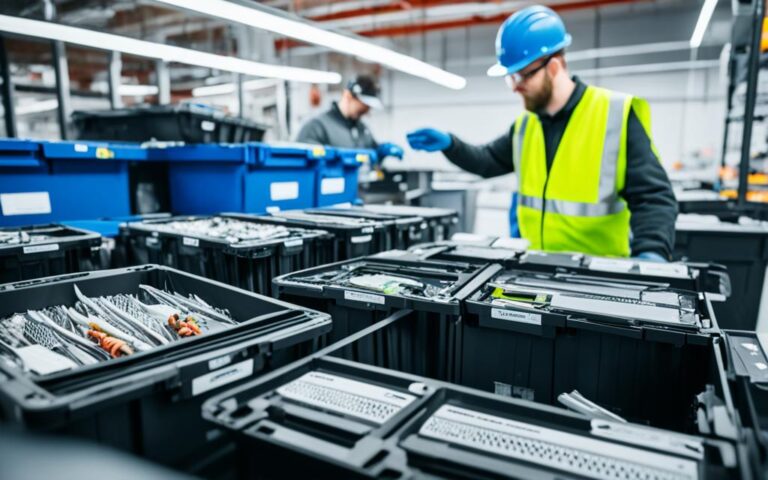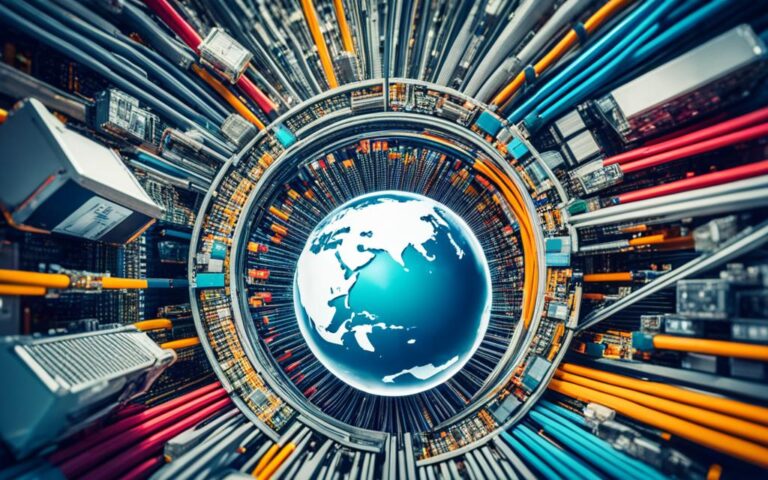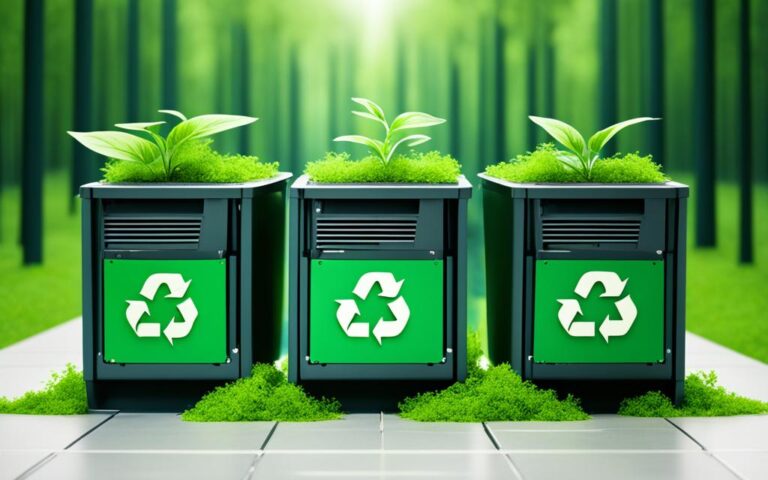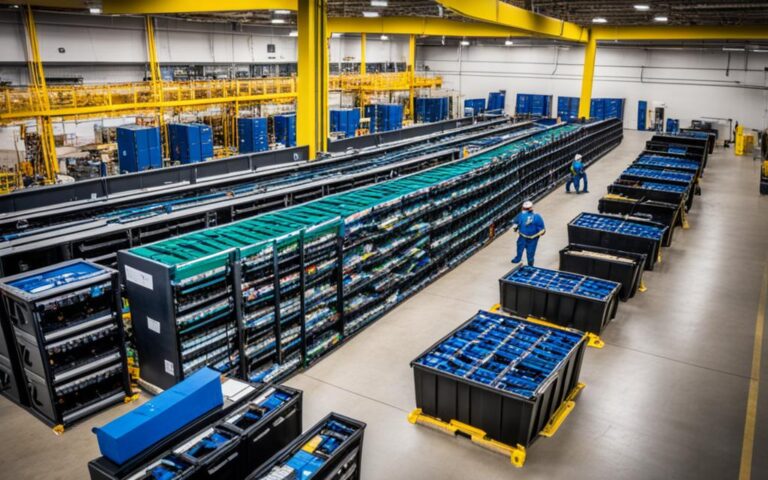How Server Recycling Reduces the Demand for Rare Earth Metals
Rare earth metals are a precious and vital resource in the production of electronic devices, including servers. However, their extraction and mining processes have significant environmental and social impacts. That’s where server recycling comes in. By recycling servers, we can recover these valuable metals and reduce the need for new mining operations.
Server recycling not only conserves valuable resources but also minimizes the environmental footprint of the electronics industry. It contributes to the circular economy by promoting the reuse of materials and reducing electronic waste. With advancements in technology, the efficiency and sustainability of electronics recycling have improved, creating a greener and more sustainable future for the tech industry.
The Environmental Impact of Electronic Waste
Electronic waste, or e-waste, is a growing problem globally. In 2019, approximately 53.6 million metric tonnes of e-waste were discarded, a number expected to increase by nearly 40% by 2030. Improper disposal of electronic waste poses significant environmental risks.
E-waste contains toxic substances such as dioxins, PCBs, cadmium, and mercury, which can contaminate soil, water, and air when not properly managed.
Recycling electronic devices, including servers, is essential for preventing the release of hazardous materials into the environment and reducing the ecological impact of computer disposal.
| Environmental Impacts of Electronic Waste | Examples |
|---|---|
| Soil Contamination | Pollution of agricultural land from toxic substances leaching into the soil |
| Water Pollution | Contamination of water sources due to improper disposal and leaching of hazardous chemicals |
| Air Pollution | Release of toxic fumes and heavy metals into the atmosphere during incineration or informal recycling processes |
| Ecosystem Disruption | Destruction of habitats and the loss of biodiversity as a result of environmental contamination |
- Soil contamination can lead to reduced agricultural productivity and the potential bioaccumulation of hazardous substances in the food chain.
- Water pollution poses risks to aquatic ecosystems and human health, as contaminated water sources can enter drinking water supplies.
- Air pollution from e-waste incineration contributes to respiratory problems and the release of greenhouse gases, exacerbating climate change.
- Ecosystem disruption due to environmental contamination can result in the loss of species and imbalance in ecological systems.
The Importance of Proper Electronic Waste Disposal
Proper disposal and recycling of electronic waste are imperative to mitigate its environmental impact. By recycling electronic devices, we can:
- Recover valuable metals and components for reuse, reducing the need for raw material extraction.
- Prevent the release of toxic substances into the environment.
- Minimize energy consumption and carbon emissions associated with the production of new electronics.
- Promote a circular economy by extending the lifespan of electronic devices through recycling and refurbishment.
Efforts should be made at both individual and institutional levels to raise awareness about the proper disposal of electronic waste and support initiatives that enable convenient and responsible recycling options.
The Value of Rare Earth Metals in Electronic Devices
Rare earth metals play a crucial role in the production of electronic devices, including servers. These metals, such as neodymium, are used in magnets for hard drives and motors. They possess unique magnetic and electrical properties that make them essential for the functionality of electronic components. However, rare earth metals are logistically difficult to obtain and mainly sourced from a few countries, with China being a significant producer.
Recycling servers allows for the recovery of these valuable and limited resources, reducing reliance on new mining operations and supporting domestic business and employment.
The Importance of Rare Earth Metals in Electronic Devices
Rare earth metals, including neodymium, play a vital role in the functioning of electronic devices like servers. These metals enable the creation of high-performance magnets used in hard drives and motors. Their exceptional magnetic and electrical properties make them indispensable in the production of electronic components that power our devices and keep our data secure.
While rare earth metals are essential, their availability is limited. They are primarily sourced from a few countries, with China dominating the market. This concentration of production poses significant challenges in terms of supply chain security and stability.
The Significance of Recycling Servers for Rare Earth Metals
Server recycling offers a solution to the challenges posed by the limited availability of rare earth metals. By recycling servers, we can recover these valuable resources and reduce our reliance on new mining operations. This not only conserves rare earth metals but also helps lessen the environmental impact associated with mining and extraction.
“Recycling servers is a sustainable practice that allows us to extract rare earth metals from old devices, reducing the need for new mining and supporting a more circular economy.” – John Davis, Environmental Engineer
Furthermore, recycling servers contributes to the development of local businesses and employment opportunities. Instead of relying solely on imports, recycling initiatives can create a more self-sufficient supply chain and promote domestic economic growth.
The Future of Electronic Devices and Rare Earth Metals
As the demand for electronic devices continues to grow, it is imperative to explore sustainable practices that ensure the availability of rare earth metals. Embracing server recycling and fostering responsible e-waste management will lead to a more sustainable and environmentally conscious tech industry. Continued research and innovation in recycling technologies will further enhance the efficiency of rare earth metal recovery from electronic devices, contributing to a greener future for electronic manufacturing.
The Challenges of Electronics Recycling
Electronics recycling is an essential practice for promoting sustainability and minimizing electronic waste. However, this process is not without its challenges. Addressing these obstacles is crucial to ensure effective and efficient operations. The key challenges faced in electronics recycling include market limitations, data security concerns, and the prevalence of counterfeit parts.
Market Limitations
One of the significant challenges in electronics recycling is the limited profitability due to narrow profit margins. Smaller players in the recycling industry often struggle to compete with larger recycling facilities that benefit from economies of scale. This disparity can hinder the growth and expansion of smaller recycling operations, impacting the overall effectiveness and reach of electronics recycling efforts.
Data Security Concerns
Ensuring data security during the electronics recycling process is paramount. Electronic devices often contain sensitive and confidential information that must be properly handled and protected. Inadequate data security measures can result in the unintentional disclosure of personal or corporate data, leading to potential privacy breaches and identity theft. To address this challenge, robust data sanitization and destruction procedures must be implemented to safeguard sensitive information throughout the recycling process.
The Prevalence of Counterfeit Parts
The presence of counterfeit parts poses a significant challenge in electronics recycling. Counterfeit components found in recycled devices can impact the quality, reliability, and safety of the recycled materials. Identifying and eliminating counterfeit parts is crucial to ensure the production of high-quality recycled electronics. Implementing stringent quality control measures, including thorough inspections and testing, can help mitigate this challenge and maintain the integrity of the recycling process.
“The challenges in electronics recycling highlight the need for continuous improvement and innovation in the industry. By addressing market limitations, ensuring data security, and combating counterfeit parts, we can unlock the full potential of electronics recycling and create a more sustainable future.”
– Jane Stewart, Recycling Industry Expert
Overcoming these challenges is crucial to maximize the effectiveness of electronics recycling efforts. By addressing market limitations, implementing robust data security measures, and combating the prevalence of counterfeit parts, the electronics recycling industry can continue to thrive and lead the way in sustainable waste management.
To visualize the challenges faced in electronics recycling, refer to the table below:
| Challenges | Description |
|---|---|
| Market Limitations | Narrow profit margins and difficulties for smaller players to compete with larger recycling facilities |
| Data Security Concerns | The need to protect sensitive information during the recycling process |
| Prevalence of Counterfeit Parts | The presence of counterfeit components impacting the quality and reliability of recycled materials |
Addressing these challenges is crucial for the sustainable growth of the electronics recycling industry and the conservation of valuable resources.
Advancements in Technology for Electronics Recycling
Technology plays a vital role in improving the efficiency and sustainability of electronics recycling. Innovations in the field of electronic waste management are enabling the development of more effective methods to extract valuable metals from discarded devices, reducing the environmental impact of electronic waste. With the continuous advancement of technology, the future of electronics recycling looks promising.
One of the key advancements in electronics recycling is the use of shredding technology. Shredders break down electronic devices into smaller pieces, making it easier to separate valuable metals from other materials. This process maximizes material recovery and ensures that valuable resources are not wasted.
Robotic disassembly is another emerging technology that is revolutionizing the electronics recycling industry. By automating the disassembly process, robots can efficiently dismantle electronic devices, separating components for recycling. This technology not only improves the speed and accuracy of the recycling process but also enhances worker safety by reducing their exposure to hazardous materials.
Ultrasound technology is also playing a significant role in electronics recycling. Ultrasonic waves are used to break down the bonding agents that hold electronic components together. This allows for the efficient separation of high-value metals, such as gold and platinum, from the rest of the device. Ultrasound technology offers a non-destructive and eco-friendly method of metal recovery.
Biometallurgy, a cutting-edge approach, utilizes microorganisms to extract metals from electronic waste. By harnessing the metabolic capabilities of certain bacteria and fungi, biometallurgy can recover metals in a cost-effective and sustainable manner. This technology holds great promise for the future of electronics recycling.
Overall, advancements in technology are driving significant improvements in electronics recycling. The development of innovative methods such as shredding, robotic disassembly, ultrasound technology, and biometallurgy are revolutionizing the industry. These technologies enable the efficient separation of high-value metals, promote the reuse of valuable resources, and contribute to the circular economy. Ongoing research and development in electronic waste management technology are crucial in addressing the challenges of e-waste recycling and creating a more sustainable future.
Conclusion
Server recycling is a pivotal step towards a more sustainable future for the tech industry. By embracing server recycling practices, we can significantly reduce the demand for rare earth metals and minimize the need for environmentally damaging mining operations. This not only conserves precious resources but also mitigates the ecological impact of electronic waste.
Advancements in technology further enhance the efficiency of electronics recycling, enabling the recovery of valuable metals from old servers. By using innovative separation techniques, such as shredding and robotic disassembly, we can maximize material recovery and promote the circular economy by reusing these valuable resources.
However, challenges such as market limitations and data security concerns must be addressed to ensure the widespread adoption of sustainable electronics recycling practices. Striving for responsible electronic waste management and supporting initiatives that prioritize server recycling are crucial steps towards creating a greener and more sustainable tech industry.
FAQ
How does server recycling reduce the demand for rare earth metals?
Server recycling allows for the recovery of precious and scarce metals from old devices, reducing the need for new mining operations and conserving valuable resources.
What is the environmental impact of electronic waste?
Improper disposal of electronic waste can lead to significant environmental risks, as e-waste contains toxic substances that can contaminate soil, water, and air when not properly managed.
What is the value of rare earth metals in electronic devices?
Rare earth metals, such as neodymium, play a crucial role in the production of electronic devices, as they are used in magnets for hard drives and motors, contributing to the functionality of electronic components.
What are the challenges of electronics recycling?
Electronics recycling faces challenges such as market limitations, data security concerns, and the prevalence of counterfeit parts, which can impact profitability, data protection, and the quality of recycled materials.
What advancements in technology are being made for electronics recycling?
Innovative methods, including shredding, robotic disassembly, ultrasound technology, and biometallurgy, are being employed to improve the efficiency and sustainability of electronics recycling, maximizing material recovery and promoting the circular economy.
What is the importance of server recycling?
Server recycling reduces the demand for rare earth metals, minimizing the need for new mining operations and reducing the environmental impact of electronic waste, while advancements in technology further enhance the efficiency of electronics recycling.

